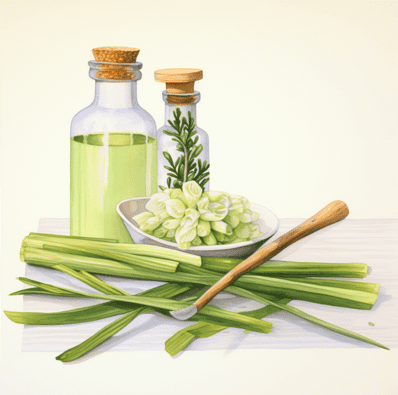
Struggling with hair loss or a troublesome scalp can really throw a wrench in feeling fabulous. Don’t worry; exploring lemongrass for hair growth might just be the game-changer you need.
Hi, I’m Hazel
I gave up on skincare after years of issues with acne and sensitive skin.
But after going plant-based, my skin cleared up and even started to glow. Now I help women reveal their natural beauty with simple, delicious plant-based food.
I also used to be a nurse, and love nerding out on nutritional science (high-quality science, that is).

As usual, this post is based on the strongest nutritional evidence I could find with a focus on the simplest, most delicious foods
…because who has time to waste on anything less?
The quick version:
Lemongrass oil may benefit hair health by nourishing hair follicles, potentially reducing hair fall and enhancing scalp health. It contains vitamins C and E, which could help combat free radicals, supporting overall hair and scalp health. This essential oil can be integrated into hair care routines to potentially soothe scalp issues such as dryness and flakiness.
Exploring Lemongrass: Potential Benefits for Hair
Lemongrass isn’t just a kitchen favourite—it could be a secret weapon for your hair care. Let’s dive into how this herb might bring some good news for your tresses.

Nourishing the Roots
Lemongrass oil is thought to enrich hair follicles, potentially curbing hair fall and fostering healthy hair growth. This natural boost, enriched with antioxidant properties and essential nutrients, could be what your scalp has been craving.
Soothing the Scalp
Dealing with an itchy scalp or dry scalp can be frustrating.
Lemongrass, with its potential antibacterial properties, offers calming effects that might help soothe these scalp issues, leading to a healthier head of hair. Its natural components are excellent for managing oily hair as well, balancing oil production without stripping the scalp of necessary moisture.
By incorporating the natural way of lemongrass into your routine, you could see improvements not just in hair benefits, but also in managing those pesky scalp irritations.
Using Lemongrass in Your Hair Care Routine
Integrating lemongrass into your hair care isn’t just easy—it’s a refreshing step towards lush locks.

Creating Your Lemongrass Blend
Start by mixing a few drops of lemongrass oil with a carrier oil like coconut oil or olive oil. This mixture can help enhance your hair’s natural shine and encourage hair regrowth.
Apply it to dry hair or damp hair to maximise absorption and effectiveness and gentle massage into your head. The enhanced blood circulation from massaging the oil into your scalp can further promote a healthy scalp.
Routine Refresh
Regular use of this lemongrass oil blend in your hair care routine could potentially transform your hair health.
Focus on the ends of your hair to prevent split ends and promote overall hair strength. Suitable for all hair types, this routine can help manage excess oil and maintain optimal scalp health.
Post-Application Care
After applying the lemongrass oil blend, it’s beneficial to rinse your hair with lukewarm water to remove any external use residues.
This method ensures that your hair absorbs all the beneficial properties of the oil without leaving any hair problems caused by residue.
Incorporating this blend into your routine of hair products can make a noticeable difference in the health and appearance of your hair.
Lemongrass and Hair Health: Insights for Enthusiasts
Lemongrass might not just keep your hair looking great—it could also contribute to a healthier scalp.

Vitamin-Packed Protection
Rich in vitamin C and vitamin E, lemongrass could help combat free radicals, which are known enemies of healthy hair. These antioxidants support the vitality of your hair follicles and maintain the health of your scalp.
A Natural Approach to Scalp Care
Whether its reducing scalp irritation or addressing flaky scalp conditions, lemongrass’s natural properties provide a gentle yet effective solution. Embrace this natural remedy to keep your scalp feeling refreshed and irritation-free.
Integrating Lemongrass Into Your Diet
Adding lemongrass to your meals not only spices up your dishes but could also indirectly benefit your hair health.
Lemongrass in Your Meals
Incorporate lemongrass leaves into your soups, teas, or stir-fries to enjoy its natural sweetness and potential health benefits. Consuming lemongrass is a delightful way to possibly improve the overall health of your hair and scalp from the inside out.
Quick and Nutritious Recipes
Lemongrass Tea
For a simple and refreshing drink, steep chopped lemongrass in boiling water for about 5 to 10 minutes. This herbal tea can be enjoyed hot or chilled and is perfect for hydrating while providing potential health benefits.
You may also like: 5 Ways With Lemongrass and Ginger Tea
Lemongrass Marinade
Create a flavourful marinade for tofu or vegetables by combining minced lemongrass with garlic, ginger, a bit of soy sauce, and sesame oil. This marinade infuses dishes with a burst of flavour and makes a nutritious addition to any meal.
Lemongrass-Infused Coconut Rice
Cook your rice with a stalk of lemongrass to infuse it with a subtle citrus flavour. Simply place a whole lemongrass stalk, bruised and tied into a knot, into your rice cooker with coconut milk and rice. Remove the lemongrass before serving for a fragrant and flavourful side dish.
Lemongrass for Hair Growth
Exploring the potential benefits of lemongrass oil could be a turning point for your hair health and scalp health. Whether applied topically or included in your diet, lemongrass offers a refreshing, natural approach to maintaining lush, healthy hair. By adopting lemongrass into your hair care products and meals, you’re not only treating your hair to a natural remedy but also embracing a holistic approach to beauty and wellness. Give it a try and see how this versatile herb transforms your hair care routine and contributes to your overall hair health.
References
Most references below will link to the original peer-reviewed study itself. However, sometimes I will link to a video over at NutritionFacts.org instead, which is by far the single best resource of brutally transparent nutritional evidence you will ever see. Dr Greger tells a great story about the realities of the science and if I think you will benefit more from one of his videos, the link will take you there instead.
Happy nerding!